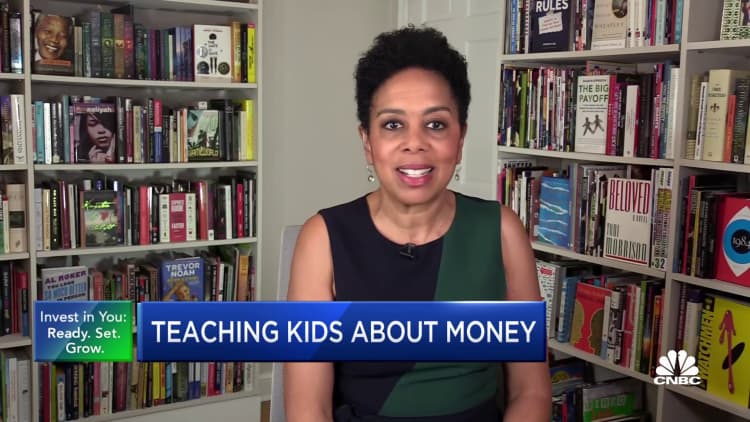
Most Americans believe it is the job of parents to teach their kids about money.
Yet many don't actually talk to their children about finances, a CNBC + Acorns Invest in You survey found.
Some 83% of U.S. adults said parents are the most responsible for educating their children on the topic, according to the survey, conducted by Momentive. The online poll was conducted March 23-24 among a national sample of 3,953 adults, 1,149 of whom were parents.
At the same time, only 15% of parents said they spoke with their children more than once a week about household finances, 13% said once a week and 16% said once a month. Some 24% talk to their children less often and 31% never do.
Those who earn less money were more likely to have those money conversations once a week or more, as were Black and Hispanic respondents, the survey found.
"Every child's very first teacher is their parent," said Yanely Espinal, director of educational outreach at Next Gen Personal Finance, a nonprofit personal finance organization.
"This means early money lessons in the home are critical."
Yet many parents may have feelings of self-doubt.
"It seems like a herculean task, an endeavor to take on to teach your kids about money when you don't really feel comfortable about the topic of money yourself," said certified financial planner Tom Henske, managing partner at New-York based The Affluent Insurance Advisor.
Conversations around the dinner table once a month can make a big difference, he said.
"What we need to do is create an environment where we just get kids excited talking about it," said Henske, whose book for parents on how to teach kids about money, "It Makes Total Cents," is expected to be released in June.
The case for school
There is also a role for schools to play, advocates argue.
"Failing to include personal finance instruction in public schools would risk perpetuating generational cycles where children whose parents had access to financial education themselves will be able to pass those lessons down, while children whose parents didn't have access to financial education would be at a disadvantage," said Espinal, whose parents are immigrants from the Dominican Republic.
When she was growing up, her family didn't have any financial accounts and instead just used cash. Espinal only learned about money management after making some costly mistakes.
The trend towards in-school personal finance classes is slowly building. Recently, Florida became the largest state to mandate a personal finance course for high-school graduation. Twenty-five states now require high-school students to take personal finance coursework, either in a standalone class or integrated into another course, according to the Council for Economic Education.
In addition, there are 46 personal finance bills pending in 21 states, according to Next Gen Personal Finance bill tracker.
"Research shows that students who are able to participate in financial economic education class in high school make better decisions about their college financing," said Nan Morrison, president and CEO of the Council for Economic Education.
"They have better credit scores," she added. "They have lower loan default rates."
Teaching your kids about money
Still, parents should start teaching their kids about money at a young age.
Resources abound, if you know where to look. The Council for Economic Education offers free Family-At-Home Financial Fun Packs, which are age-appropriate games, activities and worksheets that you can do together.
Next Gen Personal Finance also has free online games and activities on topics like investing and budgeting, and the National Endowment for Financial Education has free online courses, learning activities and quizzes.
More from Invest in You:
Want a fun way to teach your kids about money? Try these games
Inflation fears force Americans to rethink financial choices
Here's what consumers plan to cut back on if prices continue to surge
You can also provide lessons through real-life examples, such as letting your kids see you pay for items at the store. If you use a credit card, explain how it works.
Those monthly dinner conversations are also key, Henske said. Start by asking your children an open-ended question, such as, "What do you think are the ways we borrow money in this house?"
"It starts a whole conversation about borrowing, lending, mortgages, credit cards, car loans," he said.
Money in your children's hands is also a powerful learning tool, Henske said.
Some 44% of respondents in the CNBC + Acorns Invest in You survey said they gave their children an allowance, while 55% said they did not. However, how your kids earn money is really a personal decision, he said. That can be through an allowance, job or gifts.
"You would never take your kid to a tennis lesson without a racket," Henske said.
"You can't teach your kids about money sufficiently without having some money in their hands to practice."
SIGN UP: Money 101 is an 8-week learning course to financial freedom, delivered weekly to your inbox. For the Spanish version Dinero 101, click here.
Disclosure: NBCUniversal and Comcast Ventures are investors in Acorns.






